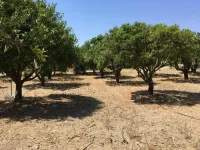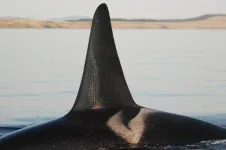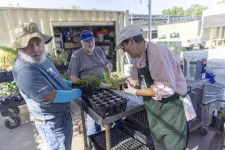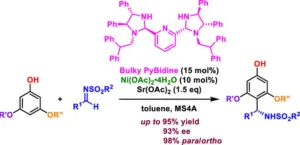(Press-News.org) For years, unrecycled plastic bottles have been dumped in landfills. Now, thanks to new research from UBC Okanagan, those bottles may have a second life in that landfill—stabilizing its earth walls.
Used plastic bottles and textiles pose an increasing problem for landfills worldwide. Researchers say nearly a hundred million metric tons of polyethylene terephthalate (PET), also known as microplastics, are produced globally each year—with a fraction of that number being recycled—making it one of the largest sources of plastic waste.
“One way we can manage plastic waste is through integrating it into geotechnical construction,” explains doctoral student Alok Chandra. “By finding new ways to use these discarded plastics, we can divert them from landfills and use them to stabilize cover materials within landfills.”
Chandra and his supervisor, UBCO Engineering Professor Dr. Sumi Siddiqua, have developed a new method of incorporating PET waste into clay soil stabilization.
“Due to its nontoxicity, low biodegradability and accessibility, it shows considerable potential for use in landfill designs. However, a considerable amount of research is still required,” says Dr. Siddiqua. “This not only solves the solid waste problem but also increases the economic value of waste and encourages its re-circulation back from already polluted lands and oceans.”
The study suggests the reused material strengthens the soil and serves as a water-resistant layer that will keep pollutants such as lead from escaping the landfill.
“Our results show great potential, but there is still some work to be done before we will integrate the PET waste into landfill soil stabilization management,” says Chandra.
The research is published in the journal Waste Management and funded by the Natural Sciences and Engineering Research Council of Canada Discovery Grants Program.
END
UBC Okanagan researchers investigate new use for plastic bottles
Instead of going to a landfill, they may help with future soil stabilization
2023-07-20
ELSE PRESS RELEASES FROM THIS DATE:
Bats struggle during organic farming transition
2023-07-20
Bat activity falls as farms make the transition to organic agriculture, new research shows.
Organic farming is better for biodiversity than conventional farming, which relies heavily on substances such as pesticides, herbicides and fertilisers.
However, little is known about how wildlife is affected by the transition period when a farm goes organic.
The new study, led by the universities of Bristol, Göttingen and Exeter, assessed the effects of organic farming by monitoring insect-eating bats at citrus ...
Male killer whales protected by post-menopause mothers
2023-07-20
Post-menopause female killer whales protect their sons – but not their daughters – from fights with other whales, new research shows.
Scientists studied “tooth rake marks” – the scarring left when one whale scrapes their teeth across the skin of another – and found males had fewer marks if their mother was present and had stopped breeding.
Only six species – humans and five species of toothed whales – are known to experience menopause, and scientists have long been puzzled about why this occurs.
The new study – by the universities ...
How eelgrass spread around the world
2023-07-20
Seagrasses evolved from freshwater plants and use sunlight and carbon dioxide (CO2) for photosynthesis and are able to thrive in depths down to 50 metres. In contrast to algae, they possess roots and rhizomes that grow in sandy to muddy sediments. The grass-like, leaf-shoots produce flowers and complete their life cycle entirely underwater. Seeds are negatively buoyant but seed-bearing shoots can raft, thus greatly enhancing dispersal distances at oceanic scale.
As a foundational species, eelgrass provides critical shallow-water habitats for diverse biotas and also provides numerous ecosystem services including carbon uptake. Seagrasses have recently been recognised as one of the important ...
PCORI makes first funding awards to advance the science on engaging patients, caregivers and other partners in health research
2023-07-20
WASHINGTON, DC – The Patient-Centered Outcomes Research Institute (PCORI) today announced the approval of $9 million for the first seven studies through its groundbreaking Science of Engagement initiative. An unprecedented research program dedicated to funding studies to demonstrate how best to engage patients, caregivers and other health care community members in comparative clinical effectiveness research (CER) and other health research, the initiative aims to grow a more robust evidence base to advance patient-centered, community-driven approaches to conducting research.
Since ...
New catalyst could dramatically cut methane pollution from millions of engines
2023-07-20
Individual palladium atoms attached to the surface of a catalyst can remove 90% of unburned methane from natural-gas engine exhaust at low temperatures, scientists reported today in the journal Nature Catalysis.
While more research needs to be done, they said, the advance in single atom catalysis has the potential to lower exhaust emissions of methane, one of the worst greenhouse gases, which traps heat at about 25 times the rate of carbon dioxide.
Researchers from the Department of Energy’s SLAC National Accelerator Laboratory and Washington State University ...
New resources to improve patient and public involvement in health research
2023-07-20
Patients and members of the public will be able to more easily take part in impactful research thanks to a new tool developed by the University of Birmingham’s work on Long COVID.
These resources are detailed in a paper published today in Nature Medicine from researchers working within the University of Birmingham’s Institute of Applied Health Research, the NIHR Birmingham Biomedical Research Centre (BRC) and NIHR Applied Research Collaboration West Midlands, reporting the evaluation ...
(How) cells talk to each other
2023-07-20
Like us, cells communicate. Well, in their own special way. Using waves as their common language, cells tell one another where and when to move. They talk, they share information, and they work together – much like the interdisciplinary team of researchers from the Institute of Science and Technology Austria (ISTA) and the National University of Singapore (NUS). They conducted research on how cells communicate – and how that matters to future projects, e.g. application to wound healing.
What comes to your mind when you think of biology? Animals, plants, theoretical computer models? The last one, you might not associate with it right away, although ...
Volunteering in late life may protect the brain against cognitive decline and dementia
2023-07-20
Key Takeaways:
Volunteering later in life may protect the brain against cognitive decline and dementia.
New study of older adults found better memory and executive function among those who volunteered.
Watch the video.
(Sacramento) Volunteering in late life is associated with better cognitive function — specifically, better executive function and episodic memory. Those are the findings of a new study from UC Davis Health presented today (July 20) at the Alzheimer’s Association International Conference 2023 in Amsterdam.
“We ...
New study expands the scope of aza-friedel−crafts reactions
2023-07-20
From life-saving drugs and synthetic polymers to diverse advanced materials, the products containing organic compounds seem endless, thanks in part to regioselectivity, a feature in chemical reactions where a substituent is selectively added to a specific position of an organic compound. This favors the formation of desired products with specific functionalities. One notable regioselective reaction used for the precise design of organic compounds is the Friedel−Crafts reaction, which enables the addition of substituents to specific positions on aromatic compounds ...
Omega-3 fatty acids appear promising for maintaining lung health
2023-07-20
Omega-3 fatty acids appear promising for maintaining lung health
NIH-funded study supports new role for nutrient found in fish, dietary supplements
Omega-3 fatty acids, which are abundant in fish and fish oil supplements, appear promising for maintaining lung health, according to new evidence from a large, multi-faceted study in healthy adults supported by the National Institutes of Health. The study provides the strongest evidence to date of this association and underscores the importance of including omega-3 fatty acids in the diet, especially given that many Americans do not meet current guidelines. Funded largely by the National Heart, ...
LAST 30 PRESS RELEASES:
Gut microbiome connected with heart disease precursor
Nitrous oxide, a product of fertilizer use, may harm some soil bacteria
FAU lands $4.5M US Air Force T-1A Jayhawk flight simulator
SimTac: A physics-based simulator for vision-based tactile sensing with biomorphic structures
Preparing students to deal with ‘reality shock’ in the workplace
Researchers develop beating, 3D-printed heart model for surgical practice
Black soldier fly larvae show promise for safe organic waste removal
People with COPD commonly misuse medications
How periodontitis-linked bacteria accelerate osteoporosis-like bone loss through the gut
Understanding how cells take up and use isolated ‘powerhouses’ to restore energy function
Ten-point plan to deliver climate education unveiled by experts
Team led by UC San Diego researchers selected for prestigious global cancer prize
Study: Reported crop yield gains from breeding may be overstated
Stem cells from human baby teeth show promise for treating cerebral palsy
Chimps’ love for crystals could help us understand our own ancestors’ fascination with these stones
Vaginal estrogen therapy not linked to cancer recurrence in survivors of endometrial cancer
How estrogen helps protect women from high blood pressure
Breaking the efficiency barrier: Researchers propose multi-stage solar system to harness the full spectrum
A new name, a new beginning: Building a green energy future together
From algorithms to atoms: How artificial intelligence is accelerating the discovery of next-generation energy materials
Loneliness linked to fear of embarrassment: teen research
New MOH–NUS Fellowship launched to strengthen everyday ethics in Singapore’s healthcare sector
Sungkyunkwan University researchers develop next-generation transparent electrode without rare metal indium
What's going on inside quantum computers?: New method simplifies process tomography
This ancient plant-eater had a twisted jaw and sideways-facing teeth
Jackdaw chicks listen to adults to learn about predators
Toxic algal bloom has taken a heavy toll on mental health
Beyond silicon: SKKU team presents Indium Selenide roadmap for ultra-low-power AI and quantum computing
Sugar comforts newborn babies during painful procedures
Pollen exposure linked to poorer exam results taken at the end of secondary school
[Press-News.org] UBC Okanagan researchers investigate new use for plastic bottlesInstead of going to a landfill, they may help with future soil stabilization






